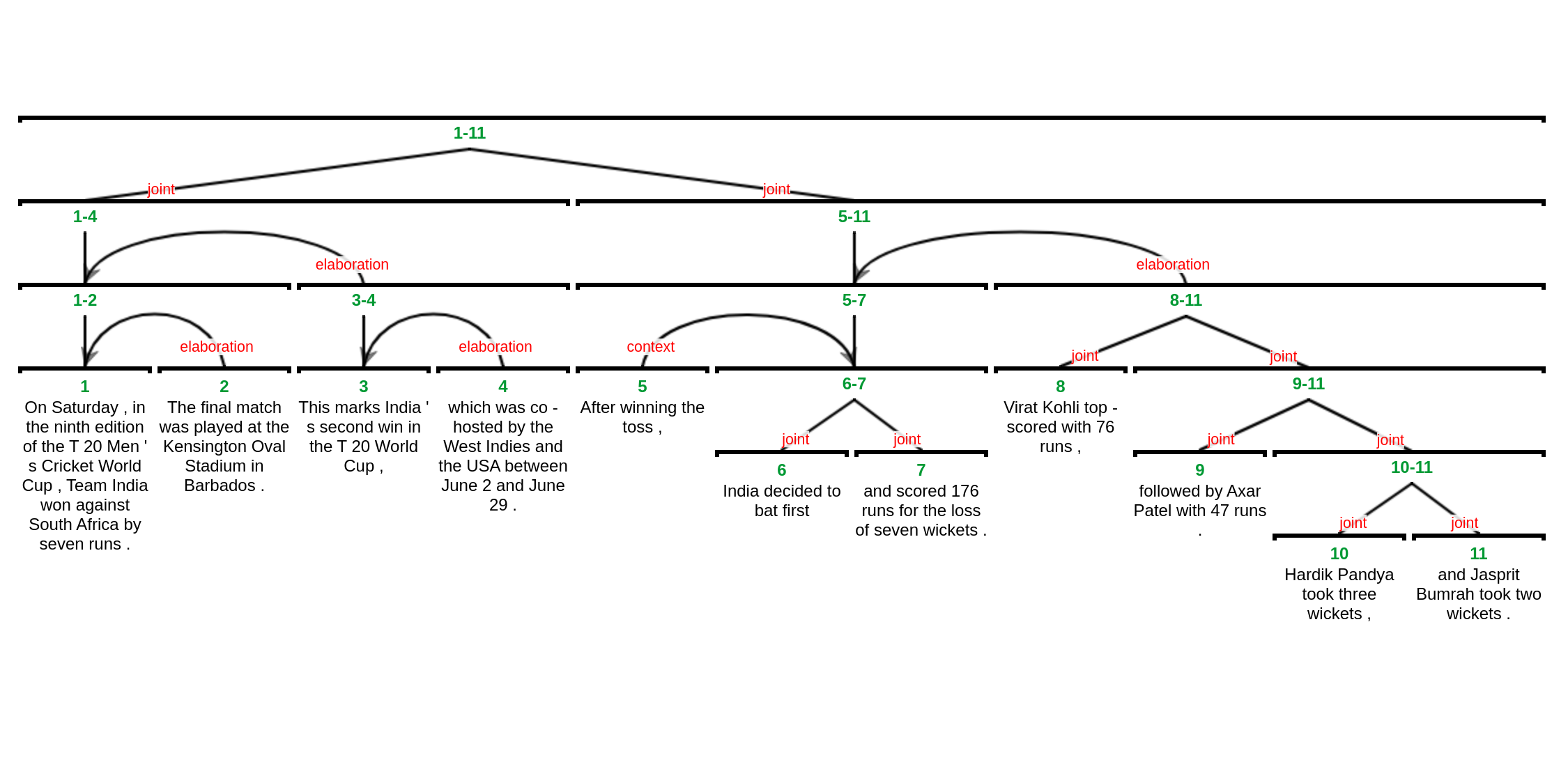IsaNLP RST Parser v3
This repository hosts several versions of the IsaNLP RST Parser. For more details, visit the GitHub repository.
Performance
The following table summarizes the end-to-end performance metrics of different model versions across various corpora:
Corpora
- English: GUM9.1, RST-DT
- Russian: RRT2.1, RRGGUM-9.1
| Tag | Language | Train Data | Test Data | Seg | S | N | R | Full |
|---|---|---|---|---|---|---|---|---|
gumrrg |
En, Ru | GUM, RRG | GUM | 95.5 | 67.4 | 56.2 | 49.6 | 48.7 |
| RRG | 97.0 | 67.1 | 54.6 | 46.5 | 45.4 | |||
rstdt |
En | RST-DT | RST-DT | 97.8 | 75.6 | 65.0 | 55.6 | 53.9 |
rstreebank |
Ru | RRT | RRT | 92.1 | 66.2 | 53.1 | 46.1 | 46.2 |
Usage
To use the IsaNLP RST Parser with Hugging Face, follow these steps:
Install the necessary Python package:
You will need the
isanlp_rstlibrary, which is available via pip:pip install isanlp_rstExample code for parsing RST:
The following Python code demonstrates how to run a specific version of the parser using the Hugging Face model:
from isanlp_rst.parser import Parser # Define the version of the model you want to use version = 'gumrrg' # from {'gumrrg', 'rstdt', 'rstreebank'} # Initialize the parser with the desired version parser = Parser(hf_model_name='tchewik/isanlp_rst_v3', hf_model_version=version, cuda_device=0) # Example text for parsing text = """ On Saturday, in the ninth edition of the T20 Men's Cricket World Cup, Team India won against South Africa by seven runs. The final match was played at the Kensington Oval Stadium in Barbados. This marks India's second win in the T20 World Cup, which was co-hosted by the West Indies and the USA between June 2 and June 29. After winning the toss, India decided to bat first and scored 176 runs for the loss of seven wickets. Virat Kohli top-scored with 76 runs, followed by Axar Patel with 47 runs. Hardik Pandya took three wickets, and Jasprit Bumrah took two wickets. """ # Parse the text to obtain the RST tree res = parser(text) # res['rst'] contains the binary discourse tree # Display the structure of the RST tree vars(res['rst'])Understanding the Output:
{ 'id': 7, 'left': <isanlp.annotation_rst.DiscourseUnit at 0x7f771076add0>, 'right': <isanlp.annotation_rst.DiscourseUnit at 0x7f7750b93d30>, 'relation': 'elaboration', 'nuclearity': 'NS', 'start': 0, 'end': 336, 'text': "On Saturday, ... took two wickets .", }- id: A unique identifier for the discourse unit.
- left and right: The left and right children of the current discourse unit.
- relation: The rhetorical relation between the two sub-units. In this example, the relation is "elaboration," indicating that one part provides additional detail about the other.
- nuclearity: Indicates the nuclearity of the relation. "NS" means that the left unit is the nucleus (N) and the right unit is the satellite (S).
- start and end: The character offsets in the text for this discourse unit.
- text: The text span corresponding to this discourse unit.
(Optional) Save the result in RS3 format:
If you wish to save the resulting RST tree in the *.rs3 file, you can easily do so using the following command:
# Export the RST tree to an RS3 file res['rst'][0].to_rs3('filename.rs3')The
filename.rs3can then be opened in RSTTool or rstWeb for visualization or editing:
Citation
If you use the IsaNLP RST Parser in your research, please cite our work as follows:
- For versions
gumrrg,rstdt, andrstreebank:@inproceedings{ chistova-2024-bilingual, title = "Bilingual Rhetorical Structure Parsing with Large Parallel Annotations", author = "Chistova, Elena", booktitle = "Findings of the Association for Computational Linguistics ACL 2024", month = aug, year = "2024", address = "Bangkok, Thailand and virtual meeting", publisher = "Association for Computational Linguistics", url = "https://aclanthology.org/2024.findings-acl.577", pages = "9689--9706" }